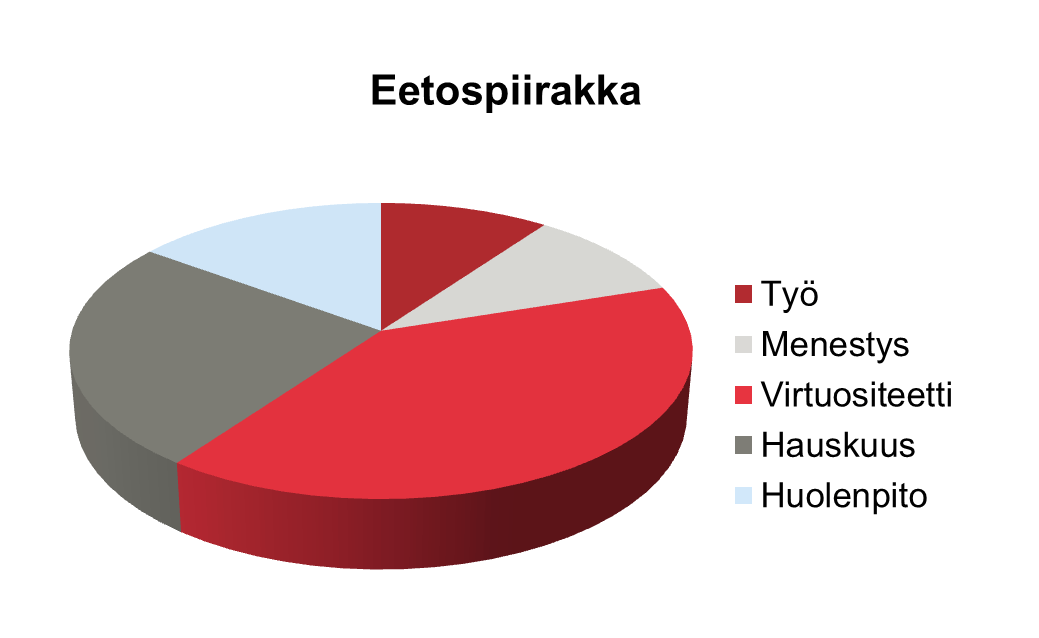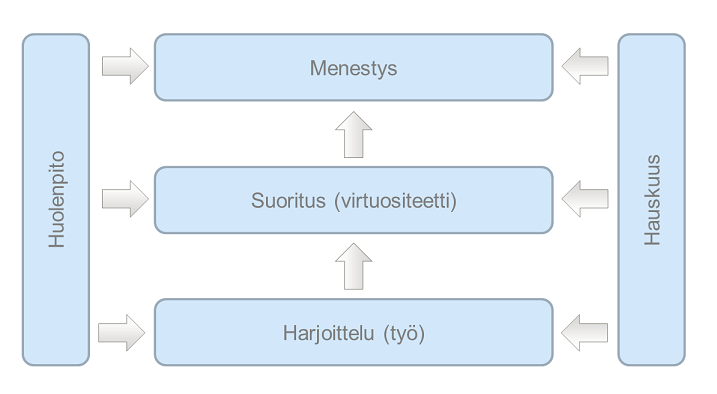At our taekwondo hall in Konala, a large number of young athletes train, whose achievements in training and competitions I have watched not only from the point of view of physical performance, but also from the point of view of these young people's enthusiasm, passion and attitude to victory and defeat. While following the young players of my own club, I have occasionally had various ideas about the development of this athlete's personality, or the mental side - if you want to say it - of guiding the development of this athlete's personality, which are not structured and somewhat unstructured, but intertwined with the same theme. It wasn't on my active mind when I went for a ski run one evening and put the earbuds in my ears.
After the opening music that sets the mood Jari Sarasvuo started talking to me. First, as a warm-up, some soft spring nuggets and SAK's manna, but Sarasvuo's story warmed up as quickly as the skier Petiko in the first ascents of Vitonen and progressed to a topic that was meaningful to me. On 7 March 2016, Jari Sarasvuo spoke in his YLE Puhee program [http://areena.yle.fi/1-3329073] on the ethos of sport. Or actually about ethos, of which he described five archetypes.
Ethos models
- Work ethic
- The ethos of success
- The ethos of virtuosity
- The ethos of fun
- Ethos of care
Of course, these were not Sarasvuo's own thoughts, and of course he did not claim that. I looked at what was said as a source Kirsi Hämäläinen dissertation [https://jyx.jyu.fi/dspace/handle/123456789/18557] – Athlete and coach in the world of sports: ethos, ideals and education in the stories of athletes” – a preface where these concepts are opened up a bit. (The study itself will definitely have to be read later at a better time.) I didn't recognize myself in anything and I recognized myself in everyone. As in life in general, the manifestations of real life here too are probably not exact descriptions of their theoretical ideas, but combinations and variations of their semi-violently compartmentalized theoretical models.
I'm not going to spoil my subjective experience of the relevance of the models to my own ethos here, or vice versa. And not even about the possibilities for guiding or shaping the ethos of young athletes, we will leave this latter topic for a separate article for later. Now I thought I would write a few of my own thoughts about the structure of the ethos model. As a rule, I'm not the type to think in black and white, and here too I tend to think that none of the ethos is the absolute best, brightest and most aspirational model. An athlete who follows any ethos 100% will hit an invisible wall before realizing his full potential. Instead, could you think of the optimum as some kind of cocktail of these archetypes, for example an ethos pie like the one below?

An optimal ethos model, is there such a thing?
What kind of pieces should the ethos of an optimal athlete - if such a thing exists now - consist of, if none of the ready-made models are perfect when fully realized?
The ethos of work includes the idea of the intrinsic value of work and suffering. Success has no meaning if it has not been achieved through uncompromising effort and endless drilling. Some parts of the work ethic are definitely needed. There are days, even longer periods, when training doesn't feel meaningful, or at least pleasant and fun. Then it's not a bad thing if the ethos of work makes the athlete turn to training, even if at that very moment they don't feel like winning the competition or showing anyone amazing performances. However, in its pure manifestation, the work ethic leads to illness more often than to the podium. So maybe this is not the main component?
The ethos of success is probably the most toxic when fully lived. In this ethos, everything stems from success. All. Up to human dignity. If only winning and being successful matter, such a person's moments of happiness are inevitably rare. The whole remains unhappy. Still, almost everyone who participates in some kind of competitive sport has traces of this ethos. I don't think there is much danger from these ribs, as long as they don't gain a significant foothold in a person's innermost being.
The ethos of virtuosity is morally easy to elevate and put on a pedestal as the single most viable ethos in the field of competitive sports. When a person is driven forward by virtuosity, the desire to perform superiorly, the focus of sports is not training or success, but performance. This is an excellent starting point. At that time, the forces driving this ethos forward may still run out, and there is no harm in a little help, for example, on the fronts of drilling or success.
The ethos of fun also sounds like a fundamentally viable model. When training and performing is fun, it is very easy to follow qualitatively and quantitatively high-quality training, which in turn leads to success. When competing at the top, success often requires, in addition to fun, the final touch of grimacing, which decides the final winners. If hedonism becomes the friend of the ethos of fun, and not, for example, the ethos of virtuosity or success, the victory in the final church struggle very easily turns to someone else.
The ethos of care focuses on community - training and competing in a circle of friends who care for each other. This ethos is undeniably good to be involved in individual sports as well, although in hindsight this is certainly emphasized in team sports. Even with my best will, I can't see a top athlete guided only by this ethos, even though it's probably clear that a fair dose of the ethos of caring is often not a bad thing.
Relationships and interaction of ethos blocks
The flowchart of success in sports should accommodate an insane number of factors influencing the core and background, but as for these ethos blocks, I outlined the structure as follows. Underlying everything is practice (the work ethic), which leads to great performance (the virtuosity ethic), which leads to success (the success ethic). This stack is underpinned by the ethos of care and fun from its edges, which sort of return the threatening to fall off the edge of the stack back to the stack model that leads to success. In this model, the blocks can then be of different sizes according to different personalities.

This article was originally published on Teemu Heino's blog at HOJOMI.ES in the spring of 2016. A heavy thing never gets old!
